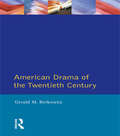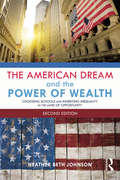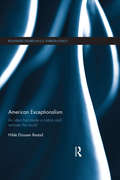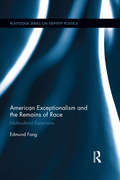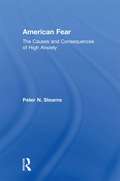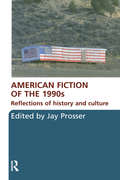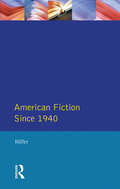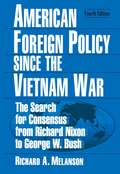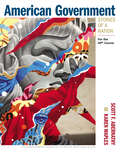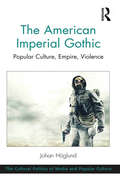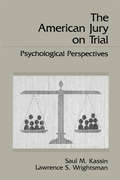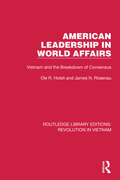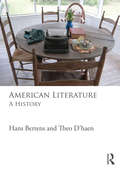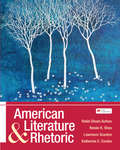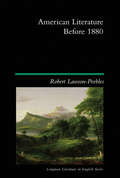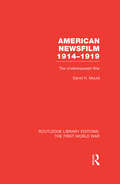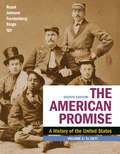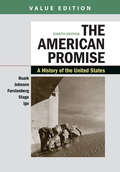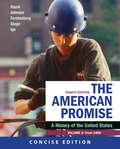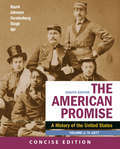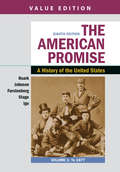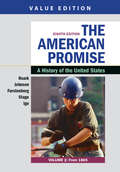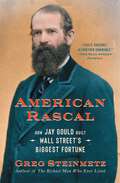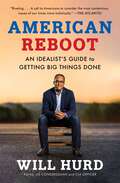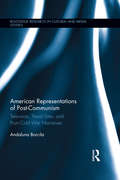Special Collections
Benetech’s Global Certified Accessible Titles
Description: Benetech’s GCA program is the first independent third-party EPUB certification to verify ebook accessibility. By creating content that is born accessible, publishers can meet the needs of all readers. Learn more: https://bornaccessible.benetech.org/
- Table View
- List View
American Drama of the Twentieth Century
by Gerald M. BerkowitzIn this book Professor Berkowitz studies the diversity of American drama from the stylistic, experimental plays of O'Neill, through verse, tragedy and community theatre, to the theatre of the 1990s. The discussions range through dramatists, plays, genres and themes, with full supporting appendix material. It also examines major dramatists such as Eugene O'Neill, Arthur Miller, Sam Shephard, Tennessee Williams and August Wilson and covers not only the Broadway scene but also off Broadway movements and fringe theatres and such subjects as women's and African-American drama.
The American Dream and the Power of Wealth
by Heather Beth JohnsonDespite the overwhelming evidence against them, many people still believe they can overcome the economic and racial constraints placed upon them at birth. In the first edition, Heather Beth Johnson explored this belief in the American Dream with over 200 in-depth interviews with black and white families, highlighting the ever-increasing racial wealth gap and the actual inequality in opportunities. This second edition has been updated to make it fully relevant to today’s reader, with new data and illustrative examples, including twenty new interviews. Johnson asks not just what parents are thinking about inequality and the American Dream, but to what extent children believe in the American Dream and how they explain, justify, and understand the stratification of American society. This book is an ideal addition to courses on race and inequality.
American Exceptionalism
by Hilde Eliassen RestadHow does American exceptionalism shape American foreign policy? Conventional wisdom states that American exceptionalism comes in two variations – the exemplary version and the missionary version. Being exceptional, experts in U.S. foreign policy argue, means that you either withdraw from the world like an isolated but inspiring "city upon a hill," or that you are called upon to actively lead the rest of the world to a better future. In her book, Hilde Eliassen Restad challenges this assumption, arguing that U.S. history has displayed a remarkably constant foreign policy tradition, which she labels unilateral internationalism. The United States, Restad argues, has not vacillated between an "exemplary" and a "missionary" identity. Instead, the United States developed an exceptionalist identity that, while idealizing the United States as an exemplary "city upon a hill," more often than not errs on the side of the missionary crusade in its foreign policy. Utilizing the latest historiography in the study of U.S. foreign relations, the book updates political science scholarship and sheds new light on the role American exceptionalism has played – and continues to play – in shaping America’s role in the world. This work will be of great interest to students and scholars of US foreign policy, security studies, and American politics.
American Exceptionalism and the Remains of Race
by Edmund FongIn contemporary American political culture, claims of American exceptionalism and anxieties over its prospects have resurged as an overarching theme in national political discourse. Yet never very far from such debates lie animating fears associated with race. Fears about the loss of national unity and trust often draw attention to looming changes in the racial demographics of the body politic. Lost amid these debates are often the more complex legacies of racial hybridity. Anxieties over the disintegration of the fabric of American national identity likewise forget not just how they echo past fears of subversive racial and cultural difference, but also exorcise as well the changing nature of work and social interaction. Edmund Fong’s book examines the rise and resurgence of contemporary forms of American exceptionalism as they have emerged out of contentious debates over cultural pluralism and multicultural diversity in the past two decades. For a brief time, serious considerations of the force of multiculturalism entered into a variety of philosophical and policy debates. But in the American context, these debates often led to a reaffirmation of some variant of American exceptionalism with the consequent exorcism of race within the avowed norms and policy goals of American politics. Fong explores how this "multicultural exorcism" revitalizing American exceptionalism is not simply a novel feature of our contemporary political moment, but is instead a recurrent dynamic across the history of American political discourse. By situating contemporary discourse on cultural pluralism within the larger frame of American history, this book yields insight into the production of hegemonic forms of American exceptionalism and how race continues to haunt the contours of American national identity.
American Fear
by Peter N. StearnsAmericans have become excessively fearful, and manipulation through fear has become a significant problem in American society, with real impact on policy. By using data from 9/11, this book makes a distinctive contribution to the exploration of recent fear, but also by developing a historical perspective, the book shows how and why distinctive American fears have emerged over the past several decades.
American Fiction of the 1990s
by Jay ProsserAmerican Fiction of the 1990s: Reflections of History and Culture brings together essays from international experts to examine one of the most vital and energized decades in American literature. This volume reads the rich body of 1990s American fiction in the context of key cultural concerns of the period. The issues that the contributors identify as especially productive include: Immigration and America’s geographical borders, particularly those with Latin America Racial tensions, race relations and racial exchanges Historical memory and the recording of history Sex, scandal and the politicization of sexuality Postmodern technologies, terrorism and paranoia American Fiction of the 1990s examines texts by established authors such as Don DeLillo, Toni Morrison, Philip Roth and Thomas Pynchon, who write some of their most ambitious work in the period, but also by emergent writers, such as Sherman Alexie, Chang-Rae Lee, E. Annie Proulx, David Foster Wallace, and Jonathan Franzen. Offering new insight into both the literature and the culture of the period, as well as the interaction between the two in a way that furthers the New American Studies, this volume will be essential reading for students and lecturers of American literature and culture and late twentieth-century fiction. Contributors include: Timothy Aubry, Alex Blazer, Kasia Boddy, Stephen J. Burn, Andrew Dix, Brian Jarvis, Suzanne W. Jones, Peter Knight, A. Robert Lee, Stacey Olster, Derek Parker Royal, Krishna Sen, Zoe Trodd, Andrew Warnes and Nahem Yousaf.
American Fiction Since 1940
by Tony HilferIn this remarkable book, Tony Hilfer provides a major survey of the wealth of post-war American fiction. He analyses the major modes and genres of writing, from realist to postmodernist metafiction and black humour, the fiction of social protest, women's writing, and the traditions of African-American, Southern and Jewish-American fiction. Key writers discussed include William Faulkner, Norman Mailer, Ralph Ellison, Saul Bellow, Joseph Heller, Vladimir Nabokov and Joyce Carol Oates. The book concludes by exploring contemporary trends through detailed case-studies of Donald Barthelme and Toni Morrison.
American Foreign Policy Since the Vietnam War
by Richard A MelansonThis book integrates the study of presidential politics and foreign policy-making from the Vietnam aftermath to the events following September 11 and the Iraqi War. Focusing on the relationship between presidents' foreign policy agendas and domestic politics, it offers compelling portraits of presidents Nixon, Carter, Reagan, Bush I, Clinton, and Bush II. In the course of comparing the efforts of these presidents to articulate a clear conception of the national interest and to forge a foreign policy consensus, the author shows the key role of public opinion in constraining presidential initiatives, in particular the decision to use military force overseas. Never more timely, this popular text is appropriate for courses in U.S. foreign policy, the presidency, or contemporary U.S. politics.
American Government
by Karen Waples and Scott AbernathyThis new offering from AP® teacher Karen Waples and college professor Scott Abernathy is tailor-made to help teachers and students transition to the redesigned AP® U. S. Government and Politics course. Carefully aligned to the course framework, this brief book is loaded with instructional tools to help you and your students meet the demands of the new course, such as integrated skills instruction, coverage of required cases and documents, public policy threaded throughout the book, and AP® practice after every chapter and unit, all in a simple organization that will ease your course planning and save you time.We’ve got you covered!With a program specifically tailored for the new AP® framework and exam.With a brief student edition that students will read and enjoy.With pedagogy and features that prepare students for the AP® exam like no other book on the market.With a teacher edition and resources that save you time in transitioning to the new course.With professional development to help you transition your instruction.
The American Imperial Gothic
by Johan HoglundThe imagination of the early twenty-first century is catastrophic, with Hollywood blockbusters, novels, computer games, popular music, art and even political speeches all depicting a world consumed by vampires, zombies, meteors, aliens from outer space, disease, crazed terrorists and mad scientists. These frequently gothic descriptions of the apocalypse not only commodify fear itself; they articulate and even help produce imperialism. Building on, and often retelling, the British ’imperial gothic’ of the late nineteenth century, the American imperial gothic is obsessed with race, gender, degeneration and invasion, with the destruction of society, the collapse of modernity and the disintegration of capitalism. Drawing on a rich array of texts from a long history of the gothic, this book contends that the doom faced by the world in popular culture is related to the current global instability, renegotiation of worldwide power and the American bid for hegemony that goes back to the beginning of the Republic and which have given shape to the first decade of the millennium. From the frontier gothic of Charles Brockden Brown's Edgar Huntly to the apocalyptic torture porn of Eli Roth's Hostel, the American imperial gothic dramatises the desires and anxieties of empire. Revealing the ways in which images of destruction and social upheaval both query the violence with which the US has asserted itself locally and globally, and feed the longing for stable imperial structures, this book will be of interest to scholars and students of popular culture, cultural and media studies, literary and visual studies and sociology.
The American Jury On Trial
by Lawrence S. Wrightsman and Saul M. KassinFirst Published in 1988. Routledge is an imprint of Taylor & Francis, an informa company.
American Leadership in World Affairs
by Ole R. Holsti and James N. RosenauThis book, first published in 1984, provides a wealth of original evidence that explores not only the impact of the Vietnam War on the beliefs of American leaders – the ‘lessons’ they believed had been learnt by Americans from the conflict in Vietnam.
American Literature
by Hans Bertens and Theo D'haenThis comprehensive history of American Literature traces its development from the earliest colonial writings of the late 1500s through to the present day. This lively, engaging and highly accessible guide:
offers lucid discussions of all major influences and movements such as Puritanism, Transcendentalism, Realism, Naturalism, Modernism and Postmodernism
draws on the historical, cultural, and political contexts of key literary texts and authors
covers the whole range of American literature: prose, poetry, theatre and experimental literature
includes substantial sections on native and ethnic American literatures
explains and contextualises major events, terms and figures in American history.
This book is essential reading for anyone seeking to situate their reading of American Literature in the appropriate religious, cultural, and political contexts.
American Literature and Rhetoric
by Lawrence Scanlon and Robin Dissin Aufses and Renee H. Shea and Katherine E. CordesA book that�s built for you and your students.Flexible and innovative, American Literature & Rhetoric provides everything you need to teach your course. Combining reading and writing instruction to build essential skills in its four opening chapters and a unique anthology you need to keep students engaged in Chapters 5-10, this book makes it easy to teach chronologically, thematically, or by genre.
American Literature Before 1880
by Robert Lawson-PeeblesAmerican Literature Before 1880 attempts to place its subject in the broadest possible international perspective. It begins with Homer looking westward, and ends with Henry James crossing the Atlantic eastwards. In between, the book examines the projection of images of the East onto an as-yet unrecognised West; the cultural consequences of Viking, Colombian, and then English migration to America; the growth and independence of the British American colonies; the key writers of the new Republic; and the development of the culture of the United States before and after the Civil War. It is intended both as an introduction for undergraduates to the richness and variety of American Literature, and as a contribution to the debate about its distinctive nature. The book therefore begins with a lengthy survey of earlier histories of American Literature.
American Newsfilm 1914-1919
by David H. MouldThe First World War was the first conflict in which film became a significant instrument of propaganda. For the United States, the war had two distinct phases: from August 1914 to April 1917, America was officially a neutral country; after April 1917 the United States was in the war, providing men, money and munitions for the Allies. These two phases are mirrored in the newsreels and documentary films shown in the United States. This volume starts by examining the background to the war for the movie industry – the coverage of previous conflicts and the growth of the newsreel. It examines the experiences of American cameramen who worked in the war zone: their efforts to gain access to the front, to overcome problems ranging from unreliable equipment to poor lighting conditions to evading censorship and how this shaped the coverage of the war.
The American Promise
by Michael Johnson and Patricia Cohen and Sarah Stage and François Furstenberg and James Roark and Susan Hartmann and Sarah IgoThe American Promise has long been a course favorite for its readability, clear chronology, and the voices of Americans that animate the book. Now with new co-authors, the eighth edition continues to deliver a strong narrative with political backbone and offers a new pedagogical design that reinforces that history is a discipline rooted in debate and inquiry. The American Promise has primary sources in each chapter, a full-color map and art program, and comprehensive supplement options, including LaunchPad and a free companion sourcebook.
The American Promise
by Michael Johnson and Patricia Cohen and Sarah Stage and François Furstenberg and James Roark and Susan Hartmann and Sarah IgoThe American Promise, Value Edition, has long been a favorite with students who value the text’s readability, clear chronology, and lively voices of ordinary Americans, all in a portable format. The two-color Value Edition includes the unabridged narrative and select maps and images from the comprehensive text. LaunchPad also features all of the contents of the comprehensive edition in full color, including primary source features and summative quizzing in each chapter, numerous supplement options, and a free companion sourcebook. With LaunchPad, the Value Edition is an excellent resource at an outstanding price.
The American Promise
by Michael Johnson and Sarah Stage and François Furstenberg and James Roark and Sarah IgoThe American Promise, Concise Edition is a brief, affordable text that makes history relatable. Now with new co-authors, the eighth edition continues to deliver a strong narrative with political backbone and offers a new pedagogical design that reinforces that history is a discipline rooted in debate and inquiry. The American Promise, Concise Edition, includes the unabridged narrative, primary sources in each chapter, a full-color map and art program, and comprehensive supplement options, including LaunchPad and a free companion sourcebook.
The American Promise
by Michael Johnson and Sarah Stage and François Furstenberg and James Roark and Sarah IgoThe American Promise, Concise Edition is a brief, affordable text that makes history relatable. Now with new co-authors, the eighth edition continues to deliver a strong narrative with political backbone and offers a new pedagogical design that reinforces that history is a discipline rooted in debate and inquiry. The American Promise, Concise Edition, includes the unabridged narrative, primary sources in each chapter, a full-color map and art program, and comprehensive supplement options, including LaunchPad and a free companion sourcebook.
The American Promise, Volume 1
by Michael Johnson and Patricia Cohen and Sarah Stage and François Furstenberg and James Roark and Susan Hartmann and Sarah IgoThe American Promise, Value Edition, has long been a favorite with students who value the text’s readability, clear chronology, and lively voices of ordinary Americans, all in a portable format. The two-color Value Edition includes the unabridged narrative and select maps and images from the comprehensive text. LaunchPad also features all of the contents of the comprehensive edition in full color, including primary source features and summative quizzing in each chapter, numerous supplement options, and a free companion sourcebook. With LaunchPad, the Value Edition is an excellent resource at an outstanding price.
The American Promise, Volume 2
by Michael Johnson and Patricia Cohen and Sarah Stage and François Furstenberg and James Roark and Susan Hartmann and Sarah IgoThe American Promise, Value Edition, has long been a favorite with students who value the text’s readability, clear chronology, and lively voices of ordinary Americans, all in a portable format. The two-color Value Edition includes the unabridged narrative and select maps and images from the comprehensive text. LaunchPad also features all of the contents of the comprehensive edition in full color, including primary source features and summative quizzing in each chapter, numerous supplement options, and a free companion sourcebook. With LaunchPad, the Value Edition is an excellent resource at an outstanding price.
American Rascal
by Greg SteinmetzThe gripping biography of Jay Gould, the greatest 19th-century robber barons, whose brilliance, greed, and bare-knuckled tactics made him richer than Rockefeller and led Wall Street to institute its first financial reforms.Had Jay Gould put his name on a university or concert hall, he would undoubtedly have been a household name today. The son of a poor farmer whose early life was marked by tragedy, Gould saw money as the means to give his family a better life…even if, to do so, he had to pull a fast one on everyone else. After entering Wall Street at the age of twenty-four, he quickly became notorious when he paralyzed the economy and nearly toppled President Ulysses S. Grant in the Black Friday market collapse of 1869 in an attempt to corner the market on gold—an event that remains among the darkest days in Wall Street history. Through clever financial maneuvers, he gained control over one of every six miles of the country&’s rapidly expanding network for railroad tracks—coming close to creating the first truly transcontinental railroad and making himself one of the richest men in America. American Rascal shows Gould&’s complex, quirky character. He was at once praised for his brilliance by Rockefeller and Vanderbilt and condemned for forever destroying American business values by Mark Twain. He lived a colorful life, trading jokes with Thomas Edison, figuring Thomas Nast&’s best sketches, paying Boss Tweed&’s bail, and commuting to work in a 200-foot yacht. Gould thrived in an expanding, industrial economy in which authorities tolerated inside trading and stock price manipulation because they believed regulation would stifle progress. But by taking these practices to new levels, Gould showed how unbridled capitalism was, in fact, dangerous for the American economy. This eye-opening history explores Gould&’s audacious exploitation of economic freedom triggered the first public demands for financial reform—a call that still resonates today.
American Reboot
by Will HurdFrom former Republican Congressman and CIA Officer Will Hurd, a bold political playbook for America rooted in the timeless ideals of bipartisanship, inclusivity, and democratic values.It&’s getting harder to get big things done in America. The gears of our democracy have been mucked up by political nonsense. To meet the era-defining challenges of the 21st century, our country needs a reboot. In American Reboot, Hurd, called &“the future of the GOP&” by Politico, provides a clear-eyed path forward for America grounded by what Hurd calls pragmatic idealism—a concept forged from enduring American values to achieve what is actually achievable. Hurd takes on five seismic problems facing a country in crisis: the Republican Party&’s failure to present a principled vision for the future; the lack of honest leadership in Washington, DC; income inequality that threatens the livelihood of millions of Americans; US economic and military dominance that is no longer guaranteed; and how technological change in the next thirty years will make the advancements of the last thirty years look trivial. Hurd has seen these challenges up close. A child of interracial parents in South Texas, Hurd survived the back alleys of dangerous places as a CIA officer. He carried that experience into three terms in Congress, where he was, for a time, the House&’s only Black Republican, representing a 71 percent Latino swing district in Texas that runs along 820 miles of US-Mexico border. As a cyber security executive and innovation crusader, Hurd has worked with entrepreneurs on the cutting edge of technology to anticipate the shockwaves of the future. Hurd draws on his remarkable experience to present an inspiring guide for America. He outlines how the Republican party can look like America by appealing to the middle, not the edges. He maps out how leaders should inspire rather than fearmonger. He forges a domestic policy based on the idea that prosperity should be a product of empowering people, not the government. He articulates a foreign policy where our enemies fear us and our friends love us. And lastly, he charts a forceful path forward for America&’s technological future. We all know we can do better. It&’s time to hit &“ctrl alt del&” and start the American Reboot.
American Representations of Post-Communism
by Andaluna BorcilaWith the televised events of 1989, territories of Eastern and Central Europe that had been marked as impenetrable and inaccessible to the Western gaze exploded into visibility. As the narratives of the Cold War crumbled, new narratives emerged and new geographies were produced on and by American television. Using an understudied archive of American news broadcasts, and tracing their flashes and echoes through travel guides and narratives of return written by Eastern European-Americans, this book explores American ways of seeing and mapping communism’s disintegration and the narratives articulated around post-communist sites and subjects.
